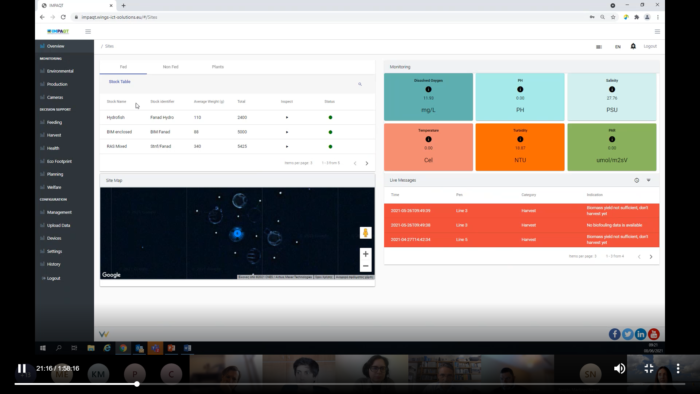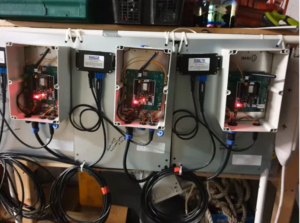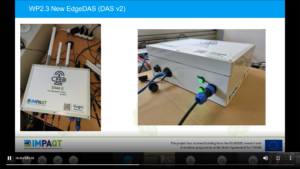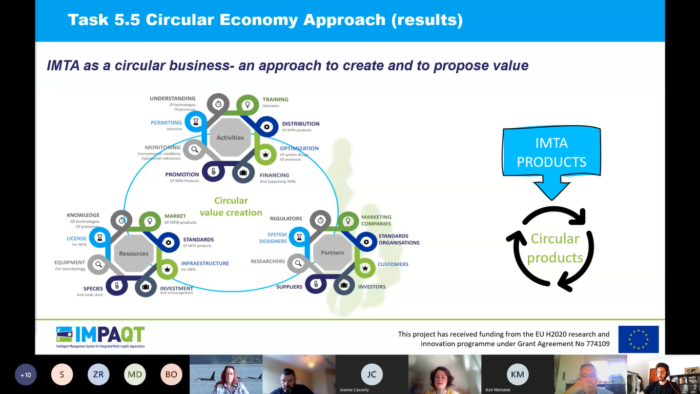Time again to meet —online— together and share the progress of the IMPAQT in the Plenary meeting held in early June. We are already at the beginning of summer and 3 months from the end of the project. However, as endings are new beginnings, we always consider the continuity and long-term availability of the knowledge gained within the project’s work, the impact of IMTA and the technologies developed, and these are reaching multi-level stakeholders. The IMPAQT team held the plenary meeting for two days in early June, sharing the progress of the project.
For this reason, Horizon4Aquaculture has been planned as a collaborative event between IMPAQT, GAIN and iFishENCi, to offer all participants a perspective as comprehensive as possible innovations for promoting and supporting the eco-intensification in aquatic systems. Therefore, Horizon4Aquaculture is developed over 3 days with 3 different but aligned themes: Policies, practices, and regulations in aquaculture (June 15th), Progress towards Circular Aquaculture (June 22nd), and Precision Aquaculture in the Blue Economy (June 29th).
In the first part of the plenary meeting, and apart from ensuring that Horizon4Aquaculture develops in the most entertaining way possible, the team of pilots has shared all the progress to date and the next steps.
The IMPAQT pilot sites show significant progress, and high-value data is collected to assess the usefulness of the IMS and its benefits. The partners who carry the pilots showed how they use the IMS platform daily, collected data and the benefits of its functionalities. Also, they expressed their needs and provided feedback to all partners to ensure that the enhancements to IMS are aligned with what an aquaculture farm manager would need.

The IMS causes an important change in the management, control and interpretation of data in aquaculture systems, allowing to go from a totally manual data collection and monitoring to a much more agile one, with savings in time (e.g. less time in the field) and costs (e.g. fewer resources needed to monitor and analyse data) and reducing the possibility of human errors, among others. Although we are working on new features and integrations, the IMS already offers an extensive catalogue of beneficial functionalities for IMTA management.
 On the first day of the plenary meeting, we have also approached the technologies developed. Some of these were: testing with nitrites and phosphates sensors and their contribution to the IMTA model, the evaluation of the acoustic communication of the underwater communication platform and the development of an app to collect data from sensors, new deployments of IADAS and status, EMS and functionalities of its auxiliary visualizer tool, and the development of a new version of DAS with additional capabilities.
On the first day of the plenary meeting, we have also approached the technologies developed. Some of these were: testing with nitrites and phosphates sensors and their contribution to the IMTA model, the evaluation of the acoustic communication of the underwater communication platform and the development of an app to collect data from sensors, new deployments of IADAS and status, EMS and functionalities of its auxiliary visualizer tool, and the development of a new version of DAS with additional capabilities.
 The work done to integrate technologies such as IADAS, DAS and IMS were also presented, as well as the data collection for the remote sensing for monitoring the environmental impact of IMTA, updates on the SIMPLEX app functions, allowing to make optimal daily decisions and future collection of feedback from pilot operators.
The work done to integrate technologies such as IADAS, DAS and IMS were also presented, as well as the data collection for the remote sensing for monitoring the environmental impact of IMTA, updates on the SIMPLEX app functions, allowing to make optimal daily decisions and future collection of feedback from pilot operators.
Last but not least, data and predictive analysis potential and utilities (e.g. biomass forecasting, organism behaviour analysis) were approached. In the context of biofouling control, new studies of biofilm characteristics are being developed. The seafood quality analysis is progressing as expected. The application potential of the IMTA modelling was also shared with the team, taking into account the main stakeholders groups.
 On the second day of the plenary session, the comprehensive analysis of the performance and results of the pilot sites was addressed, both in terms of technologies deployed and IMTA setup. The progress in evaluating the sustainability and circularity of IMTA, the analyses developed, and the latest results, which are very positive, have also been commented on. The communication and dissemination activities completed and planned were also discussed to ensure that this wonderful work for 4 years reaches anyone who can take advantage of it and enjoy it.
On the second day of the plenary session, the comprehensive analysis of the performance and results of the pilot sites was addressed, both in terms of technologies deployed and IMTA setup. The progress in evaluating the sustainability and circularity of IMTA, the analyses developed, and the latest results, which are very positive, have also been commented on. The communication and dissemination activities completed and planned were also discussed to ensure that this wonderful work for 4 years reaches anyone who can take advantage of it and enjoy it.
There is a potent exchange of learning in all consortium meetings, always co-working and collaborating as a true team. There is no doubt that we will miss them!






